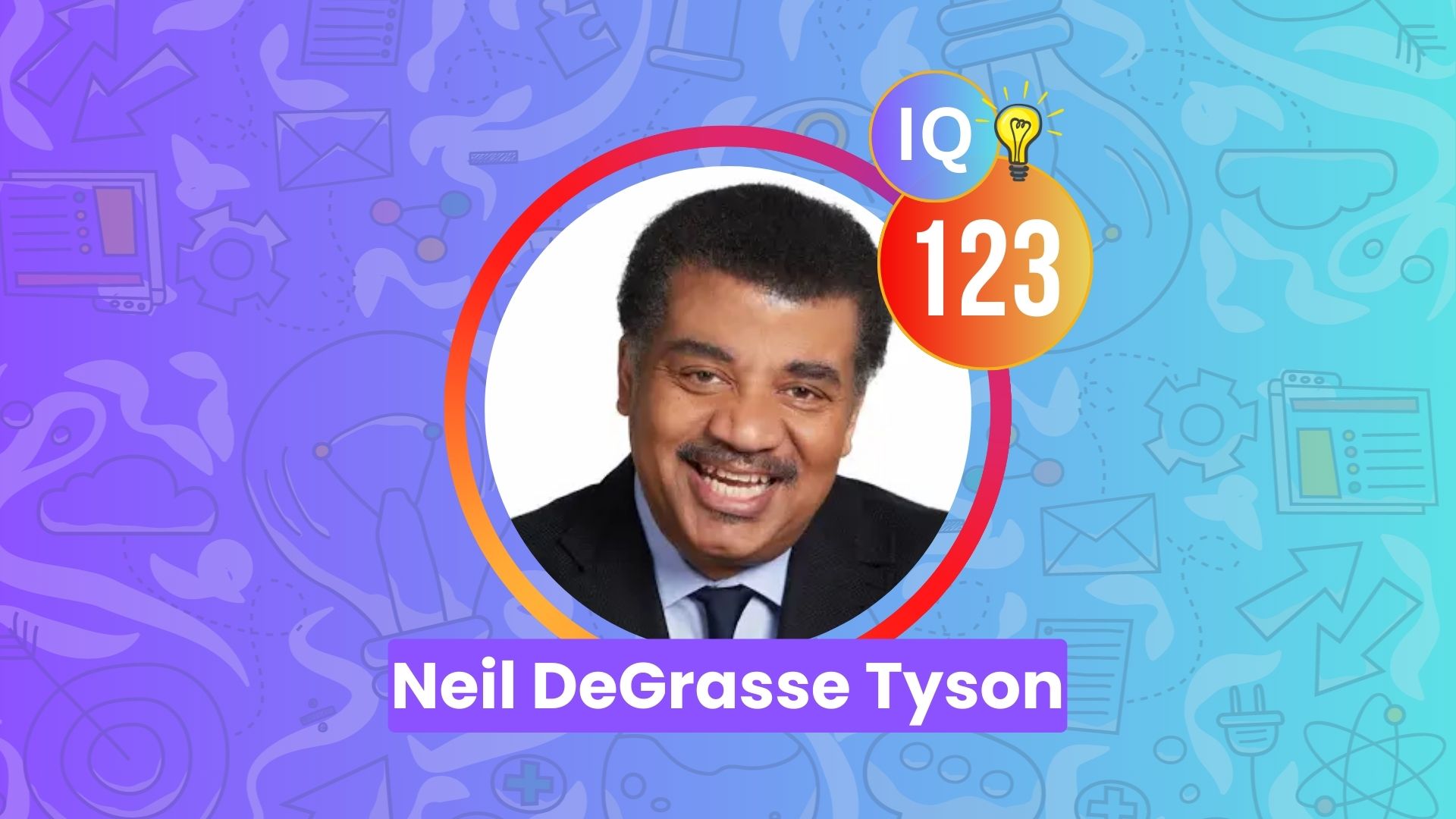When it comes to modern science popularizers, Neil deGrasse Tyson stands tall as a beacon of knowledge and inspiration. Known for his captivating talks, insightful books, and engaging TV shows, the question of "Neil Tyson IQ" often comes up in conversations. But what exactly makes him such a brilliant mind? Is it just about his IQ score, or is there more to the story? Let’s dive into this fascinating topic and uncover the genius behind the man who’s brought the universe closer to us.
Neil deGrasse Tyson has become a household name for anyone interested in astronomy, physics, or the wonders of the cosmos. His ability to simplify complex scientific concepts and make them accessible to the general public is unmatched. But beyond his charm and charisma lies a sharp intellect that many have tried to quantify through his IQ score. In this article, we’ll explore the truth behind Neil Tyson’s IQ and what it really means for his contributions to science.
While the concept of IQ is often used as a measure of intelligence, it’s important to note that it’s just one piece of the puzzle. Neil Tyson’s success isn’t solely tied to his IQ but rather a combination of his passion for science, his ability to communicate effectively, and his dedication to lifelong learning. So, let’s take a closer look at the man, the myth, and the numbers behind his legendary status.
Read also:Nigerian Actors Pictures And Names A Journey Through Nollywoodrsquos Stars
Who is Neil deGrasse Tyson?
Before we dive into the specifics of Neil Tyson’s IQ, let’s first get to know the man himself. Neil deGrasse Tyson was born on October 5, 1958, in Manhattan, New York. From a young age, he showed a keen interest in the stars and the cosmos. His fascination with the universe only grew stronger as he pursued his education in physics and astrophysics.
Early Life and Education
Growing up in New York City, Neil Tyson’s early exposure to the Hayden Planetarium sparked his lifelong love for astronomy. He attended the Bronx High School of Science, where his passion for science flourished. Later, he earned his Bachelor of Arts degree in Physics from Harvard University and went on to complete his Ph.D. in Astrophysics from Columbia University. His academic journey laid the foundation for his future as a prominent astrophysicist and science communicator.
Neil Tyson IQ: The Numbers Behind the Genius
Now, let’s talk about the elephant in the room—Neil Tyson’s IQ. While there’s no publicly available information on his exact IQ score, we can make some educated guesses based on his achievements and the nature of his work. IQ tests are designed to measure a person’s cognitive abilities, but they don’t necessarily capture the full spectrum of intelligence. Tyson’s success in science communication, research, and public engagement suggests that his intellectual capabilities extend far beyond a simple IQ score.
Is IQ the Best Measure of Intelligence?
Many people wonder if IQ is the best way to measure intelligence. While it can provide some insights into a person’s analytical and problem-solving skills, it doesn’t account for creativity, emotional intelligence, or practical knowledge. Neil Tyson’s ability to connect with diverse audiences and make complex scientific concepts relatable is a testament to his multifaceted intelligence.
- Neil Tyson’s work in science communication showcases his creativity and adaptability.
- His public speaking engagements demonstrate his emotional intelligence and ability to engage with people from all walks of life.
- His research contributions highlight his analytical skills and dedication to scientific inquiry.
Neil Tyson’s Contributions to Science
Neil deGrasse Tyson’s impact on the world of science extends far beyond his IQ score. Through his books, TV shows, and public lectures, he has inspired millions of people to explore the wonders of the universe. His ability to break down complex scientific concepts into digestible nuggets of information has made him a beloved figure in the scientific community and beyond.
Key Contributions
Some of Neil Tyson’s most notable contributions to science include:
Read also:Happy Raining Monday Turning The Blues Into Rainbows
- Hosting the popular TV series "Cosmos: A Spacetime Odyssey," which reached millions of viewers worldwide.
- Authoring numerous bestselling books, including "Astrophysics for People in a Hurry" and "Death by Black Hole."
- Serving as the Director of the Hayden Planetarium, where he continues to inspire young minds.
Neil Tyson’s Impact on Education
One of the most significant aspects of Neil Tyson’s career is his commitment to education. He believes that science should be accessible to everyone, regardless of their background or education level. Through his work, he has empowered countless individuals to pursue their curiosity and explore the mysteries of the universe.
Science Education for All
Tyson’s efforts to democratize science education have had a profound impact on society. By using platforms like social media, podcasts, and public appearances, he has reached audiences that traditional science education might have overlooked. His approach to teaching science is both engaging and inclusive, making it easier for people to grasp complex ideas.
Neil Tyson’s Influence on Popular Culture
Neil deGrasse Tyson’s influence extends beyond the scientific community and into popular culture. He has appeared on numerous TV shows, podcasts, and interviews, where he uses his platform to promote science and critical thinking. His unique ability to blend humor with science has made him a favorite among audiences of all ages.
Science Meets Entertainment
Tyson’s appearances on shows like "The Daily Show" and "The Late Show with Stephen Colbert" have helped bridge the gap between science and entertainment. By using humor and relatable examples, he makes science accessible and enjoyable for everyone. This approach not only entertains but also educates, encouraging people to think critically about the world around them.
Neil Tyson IQ: Beyond the Numbers
While the question of Neil Tyson’s IQ is intriguing, it’s essential to recognize that his success is about much more than just a number. His passion for science, his dedication to education, and his ability to connect with people from all walks of life are what truly set him apart. Tyson’s work serves as a reminder that intelligence isn’t just about IQ—it’s about how we use our knowledge to make a positive impact on the world.
Intelligence in Action
Tyson’s career is a testament to the idea that intelligence is best measured by its application. Whether he’s explaining the mysteries of the universe or advocating for science education, his work demonstrates the power of knowledge in action. By inspiring others to explore the cosmos and think critically, he continues to leave a lasting legacy in the world of science and beyond.
The Future of Science Communication
As science communication continues to evolve, Neil deGrasse Tyson remains at the forefront of this exciting field. His innovative approaches to teaching and engaging with audiences set the standard for future generations of science communicators. By combining cutting-edge research with relatable storytelling, Tyson has created a model for how science can be shared with the world.
Inspiring the Next Generation
Tyson’s impact on science education and communication will undoubtedly inspire the next generation of scientists, educators, and communicators. By showing that science can be both fascinating and accessible, he has opened doors for countless individuals to pursue their passions and contribute to the advancement of knowledge.
Neil Tyson IQ: Final Thoughts
In conclusion, the question of Neil Tyson’s IQ is just one aspect of his remarkable life and career. While his intellectual capabilities are undoubtedly impressive, it’s his passion for science, his dedication to education, and his ability to connect with people that truly define him as a genius. As we continue to explore the mysteries of the universe, Tyson’s work serves as a beacon of hope and inspiration for all who dare to dream.
We invite you to share your thoughts and insights in the comments below. What do you think about Neil Tyson’s contributions to science and education? How has he inspired you to pursue your curiosity and explore the wonders of the universe? Don’t forget to check out our other articles for more fascinating insights into the world of science and beyond!
Table of Contents
Who is Neil deGrasse Tyson?
Early Life and Education
Neil Tyson IQ: The Numbers Behind the Genius
Is IQ the Best Measure of Intelligence?
Neil Tyson’s Contributions to Science
Key Contributions
Neil Tyson’s Impact on Education
Science Education for All
Neil Tyson’s Influence on Popular Culture
Science Meets Entertainment
Neil Tyson IQ: Beyond the Numbers
Intelligence in Action
The Future of Science Communication
Inspiring the Next Generation
Neil Tyson IQ: Final Thoughts


